#pmp training
Text
PMP Online Certification Training Course
Learn about the Project Management Professional PMP Online Certification , a globally recognized credential for project managers. Learn at your preferred time.
#project management#pmpcertification#pmp#pmp exam#pmp training#training#courses#online courses#certification#pmp online
2 notes
·
View notes
Text
Project Management Professional (PMP®) Certification Live Virtual
PMP Certification is like a gold standard certificate in project management offered by PMI. Our Training program is designed to provide 100% coverage of the PMP Exam Content Outline, as provided by PMI. The Project Management Professional Certification Prep course is designed to help professionals prepare for the PMP® certification exam.
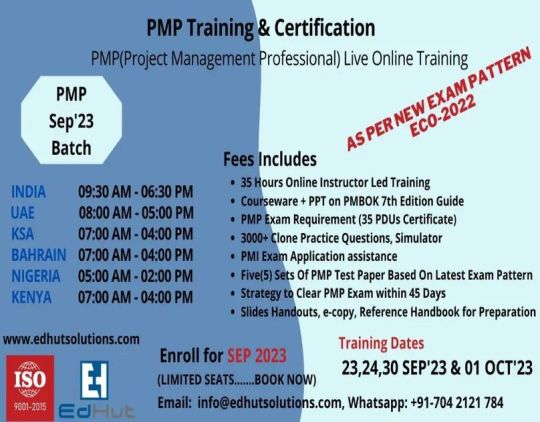
2 notes
·
View notes
Text
As a project manager, you have the responsibility to choose a development
approach to execute your project work. A project development approach is a
method according to which you’re going to create and achieve your project
deliverable whether it’s a product, service, or result. It consists in applying a set of
procedures, techniques, practices, and rules throughout your project life cycle.
#pmp online#pmp exam#pmp training#pmp certification#pmp course#project manager#project management#magedazony#drmaged#camecenter
5 notes
·
View notes
Text
Can you recommend any certifications or additional training programs to enhance my skills?
Certainly! Here are some additional certifications and training programs that can enhance your skills and complement your pursuit of the AWS DevOps Engineer Professional certification:
AWS Certified Solutions Architect – Professional: This certification focuses on advanced design principles and best practices for building scalable, reliable, and secure AWS solutions. It provides a broader understanding of AWS services and architectures, which can be valuable for DevOps professionals.
AWS Certified SysOps Administrator – Associate: This certification covers operational tasks such as managing, monitoring, and troubleshooting AWS deployments. It provides foundational knowledge of AWS services and administration skills that are relevant to DevOps roles.
Docker Certified Associate (DCA): Docker is widely used for containerization in DevOps environments. The DCA certification validates your Docker skills, including container management, orchestration, networking, and security.
Kubernetes Certifications (CKA, CKAD, CKS): Kubernetes is a popular container orchestration platform used in DevOps for deploying and managing containerized applications. The Certified Kubernetes Administrator (CKA), Certified Kubernetes Application Developer (CKAD), and Certified Kubernetes Security Specialist (CKS) certifications demonstrate proficiency in Kubernetes administration, application development, and security, respectively.
Certified Jenkins Engineer (CJE): Jenkins is a leading open-source automation server used for continuous integration and continuous delivery (CI/CD) pipelines. The CJE certification validates your expertise in Jenkins configuration, administration, and automation for DevOps workflows.
Certified Agile DevOps Professional (CADP): This certification combines Agile principles with DevOps practices, emphasizing collaboration, continuous integration, and delivery. It covers Agile methodologies, DevOps tools, and automation techniques to enhance software development and delivery processes.
Certified ScrumMaster (CSM): Scrum is a widely adopted Agile framework for managing software development projects. The CSM certification equips you with the knowledge and skills to facilitate Agile teams, ceremonies, and processes effectively.
Google Cloud Certifications: If you work with multi-cloud environments or have an interest in Google Cloud Platform (GCP), consider pursuing certifications such as Google Cloud Professional DevOps Engineer or Google Cloud Professional Architect. These certifications validate your proficiency in designing, deploying, and managing cloud-native solutions on GCP.
Microsoft Azure Certifications: Similarly, if you work with Microsoft Azure or hybrid cloud environments, explore certifications like Microsoft Certified: Azure DevOps Engineer Expert or Microsoft Certified: Azure Solutions Architect Expert. These certifications focus on deploying, managing, and optimizing solutions on Azure.
Continuous Learning and Professional Development: In addition to certifications, prioritize continuous learning and professional development by attending conferences, workshops, webinars, and online courses related to DevOps, cloud computing, automation, and emerging technologies. Platforms like Udemy, Coursera, Pluralsight, and LinkedIn Learning offer a wide range of courses on these topics.
Choose certifications and training programs that align with your career goals, interests, and skill level, and invest time and effort in mastering the relevant concepts and technologies. Continuous learning and upskilling are essential for staying competitive and advancing your career in the dynamic field of DevOps and cloud computing.
#online training course#online certification and training#cybersecuritycourse#aws certification#pmp certification cost#pmp training#pmp certification
0 notes
Text
From Novice to Expert: PMP vs. CAPM Training Unraveled
The Project Management Professional (PMP) and Certified Associate in Project Management (CAPM) certifications are two prestigious credentials offered by the Project Management Institute (PMI). They epitomize expertise in project management principles and practices. Let's look at the intricacies of PMP and CAPM training to understand their importance in today's competitive job market.
Introduction
What is PMP training?
PMP training is designed for experienced project managers who want to validate their skills and knowledge. It covers advanced project management concepts, leadership strategies, and best practices for achieving excellence in complex project environments.
What is CAPM training?
CAPM training, on the other hand, caters to entry-level professionals wishing to enter the field of project management. It provides a fundamental understanding of project management processes, terminology and techniques.
Importance of PMP and CAPM training
Both PMP and CAPM training offer many benefits that can boost your career trajectory.
career advancement
Earning any certification can open doors to lucrative job opportunities and career advancement. Employers often give preference to candidates with recognized qualifications, giving certified professionals a competitive edge.
skill enhancement
PMP and CAPM training programs equip individuals with essential project management skills such as risk management, stakeholder communication, and resource allocation. These skills are invaluable in a variety of industries and can significantly enhance job performance.
industry recognition
Earning a PMP or CAPM certification demonstrates your commitment to professional development and adherence to industry standards. This increases your credibility as a project manager and increases your chances of securing high-profile projects.
Difference between PMP and CAPM
While both certifications are offered by PMI, they cater to different audiences and have different requirements.
eligibility criteria
PMP certification requires significant project management experience (4500 to 7500 hours) and a bachelor's degree (or equivalent). In contrast, CAPM certification has no experience requirements, but does require a post-secondary degree and 23 hours of project management education.
exam format
The PMP exam consists of 200 multiple choice questions and must be completed within four hours. The CAPM exam consists of 150 multiple choice questions and has a time limit of three hours.
Certification Requirements
PMP certification is renewable every three years through continuing education or re-examination. CAPM certification is valid for five years and can be renewed by submitting Professional Development Units (PDUs).
PMP Training Overview
PMP training covers a comprehensive curriculum that aligns with the Project Management Body of Knowledge (PMBOK) guide. This includes topics such as project integration, scope management, quality assurance, and professional ethics.
CAPM Training Overview
CAPM training introduces beginners to fundamental project management concepts and terminology. It covers topics such as project life cycle, project scheduling, cost management and risk identification.
Choosing between PMP and CAPM
When deciding between PMP and CAPM certification, consider factors such as your career goals, experience level, and financial investments.
career goals
If you aspire to take on senior leadership roles or manage complex projects, the PMP certification is the ideal choice. However, if you are new to project management and looking for entry-level positions, the CAPM certification provides a solid foundation.
experience level
The PMP certification is best suited for experienced project managers with many years of practical experience. CAPM certification is more suitable for individuals who have limited or no experience in project management.
Time and cost considerations
PMP certification requires a significant time commitment to prepare for the exam and generally costs more than CAPM certification. Consider your budget and availability before committing to any program.
Benefits of PMP Certification
high salary potential
PMP-certified professionals earn higher salaries than their non-certified counterparts. Certification validates your expertise and demonstrates your ability to deliver successful projects, making you a valuable asset to employers.
global recognition
PMP certification is globally recognized and respected across all industries. It opens doors to job opportunities around the world and increases your credibility as a project management professional.
leadership opportunities
PMP certification equips you with advanced leadership and strategic management skills, qualifying you for leadership positions within organizations. It demonstrates your ability to lead teams and execute projects effectively.
Benefits of CAPM Certification
Entry Level Project Management Roles
CAPM certification is an important step for individuals entering the field of project management. It provides a solid understanding of project management principles and enhances your marketability to employers.
Skill Development
CAPM training enhances your project management skills and prepares you for future career advancement opportunities. It equips you with the essential knowledge and techniques needed to succeed in project-based roles.
Path to PMP Certification
CAPM certification lays the groundwork for pursuing advanced certifications such as PMP in the future. It demonstrates your commitment to professional development and puts you on the path to becoming an experienced project management professional.
PMP vs CAPM Salary Comparison
PMP-certified professionals typically earn higher salaries than CAPM-certified individuals. However, both certifications significantly increase earning potential and job opportunities in the project management field.
Testimonials and Success Stories
Real-life testimonials from PMP and CAPM-certified professionals highlight the real benefits of certification. These success stories show how certification has positively impacted their careers and propelled them toward greater success.
conclusion
Ultimately, PMP and CAPM certifications provide valuable credentials that validate your project management skills and enhance your career prospects. Whether you're a seasoned professional or just beginning your journey in project management, investing in a certification can significantly enhance your marketability and open the door to exciting opportunities.
questions to ask
Is PMP Certification Suitable for Entry Level Professionals?
While PMP certification is typically pursued by experienced project managers, entry-level professionals can also benefit from obtaining the certification. This shows commitment to the field and can accelerate career growth.
Can I get CAPM certification without any prior project management experience?
Yes, the CAPM certification is designed for individuals who have limited or no project management experience. It provides a basic understanding of project management principles and terminology.
How much time does it take to prepare for PMP exam?
The time required to prepare for the PMP exam varies depending on your existing knowledge and study habits. On average, candidates spend 3-6 months preparing for the exam.
What are the career prospects after obtaining PMP certification?
PMP-certified professionals have access to a wide range of job opportunities, including project manager, program manager, and project consultant roles. They may also achieve leadership positions within organizations.
Is CAPM certification recognized globally?
Yes, CAPM certification is recognized and respected worldwide as a foundational credential in project management.
0 notes
Text
Project Charter Essentials That You Will Learn in Your PMP Training
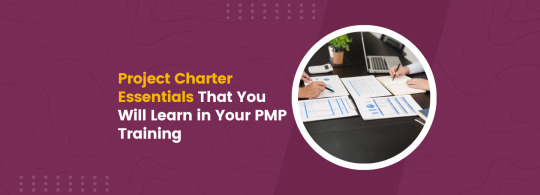
A well-crafted project charter serves as a cornerstone for successful project initiation and execution. You will learn in your PMP training that how it outlines the project's objectives, scope, deliverables, and key stakeholders, providing a roadmap for the project team to follow. This blog discusses the essential components of a project charter PMP and explore key considerations for modern project management practices.
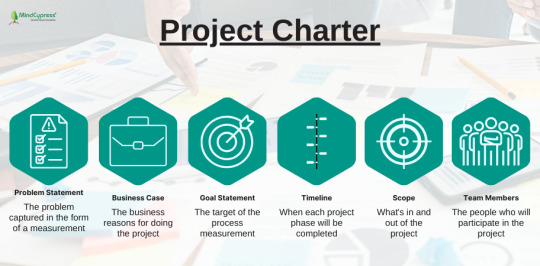
Project Overview in Project Charter
The project overview section provides a high-level summary of the project, including its purpose, objectives, and anticipated benefits. It sets the context for the project and ensures that all stakeholders have a clear understanding of its goals and objectives from the outset.
Project Scope
Defining the project scope is crucial for establishing boundaries and expectations. The project scope outlines the specific deliverables, tasks, and activities that will be included in the project, as well as any exclusions or limitations. Also, it helps prevent scope creep and ensures that the project remains focused on its intended outcomes.
Stakeholder Analysis
Identifying and engaging key stakeholders is essential for project success. The stakeholder analysis section of the project charter identifies the individuals or groups who have an interest in or will be affected by the project. It outlines their roles, responsibilities, and expectations, as well as strategies for communication and engagement.
Project Objectives and Success Criteria in Project Charter
Clearly defined project objectives and success criteria are essential for measuring project performance and outcomes. It should articulate specific, measurable, achievable, relevant, and time-bound (SMART) objectives that align with the organization's strategic goals. Success criteria define what success looks like for the project and provide a benchmark for evaluating its effectiveness.
Project Deliverables
The project deliverables section specifies the tangible outputs or outcomes that the project will produce. It provides clarity on what the project team is expected to deliver and helps manage stakeholder expectations. Deliverables should be defined in terms of quality, quantity, and timeframe to ensure alignment with project objectives.
Project Constraints and Assumptions
Every project operates within certain constraints and assumptions that may impact its execution. The project charter PMP should identify and document any constraints, such as budget, schedule, resources, or regulatory requirements, that may limit the project's scope or flexibility. Additionally, it should outline any assumptions made during project planning and their potential implications.
Project Governance and Decision-Making in Project Charter
Establishing clear governance structures and decision-making processes is essential for effective project management. The project charter should define roles and responsibilities within the project team, as well as escalation procedures for resolving issues or conflicts. It should also specify how decisions will be made, including criteria for prioritization and approval.
Risk Management
Identifying and mitigating project risks is critical for minimizing uncertainties and ensuring project success. The project charter should include a risk management plan that identifies potential risks, assesses their likelihood and impact, and outlines strategies for mitigating or responding to them. It helps the project team anticipate challenges and proactively address them throughout the project lifecycle.

Conclusion
In conclusion, a well-crafted project charter is essential for laying the foundation for successful project management. By including key components such as project overview, scope, stakeholder analysis, objectives, deliverables, constraints, assumptions, governance, decision-making, and risk management, the project charter provides a roadmap for guiding the project team and stakeholders throughout the project lifecycle. In the fast-paced world of modern project management, investing time and effort in developing a comprehensive project charter can set the stage for project success and ensure alignment with organizational goals and objectives.
You can learn more about Project Management from a trusted learning partner. MindCypress offers transformative professional online training programs including PMP Training. The course structure equips the learners with the skills and knowledge that enable them to perform their duties efficiently.
Resource: https://www.mindcypress.com/blogs/project-management/project-charter-essentials-that-you-will-learn-in-your-pmp-training
0 notes
Text

Hand holding support available with 100% passing assurance.. Are you looking for any I.T Certification Support. We Provide Clearance Assistance for All Certification 100% Passing Guarantee 💯💯 #Certification #Training & #Dumps #JobSupport #intervewsupport #worksupport
Contact Us :
WhatsApp :- https://wa.link/notbtk
#ccna course#ccna training#cisco ccna#pmp exam#ccna certification#cyber security#pmp certification#pmp course#pmp training#cisco#cisa#cisa certification
1 note
·
View note
Text
PMI PMP
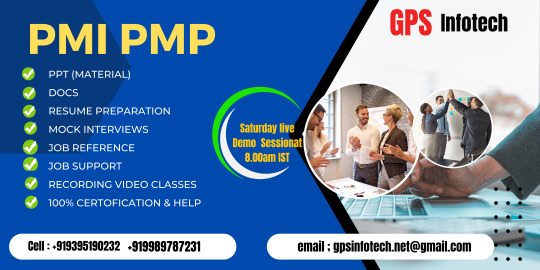
#business#education#student#technology#pmp certification#pmp course#pmp exam#pmp training#pmi#pmicertification
0 notes
Text
Unichrone - PMP Certification Online Training
Take up Unichrone’s PMP Certification Training to stay up to date with the latest project management trends and clear PMP Exam without hassles.
Click here: https://unichrone.com/pmp-certification-training
0 notes
Text
Master Project Management: GBMC Tools & Techniques Course
Dive into the world of project management with our comprehensive course on GBMC Tools and Techniques! Whether you're a seasoned project manager or new to the field, this course offers invaluable insights and practical strategies to enhance your project management skills. Learn from industry experts and gain hands-on experience with GBMC's proven methodologies. From project planning to execution and monitoring, this course covers all aspects of effective project management. Enroll now and take the next step towards becoming a proficient project manager
1 note
·
View note
Text
How can I pass the AWS DevOps engineer professional certification in 2024?
To pass the AWS DevOps Engineer Professional certification in 2024, you'll need to prepare diligently and thoroughly understand the concepts, services, and best practices relevant to AWS DevOps. Here's a step-by-step guide to help you succeed:
Understand the Exam Blueprint: Familiarize yourself with the AWS Certified DevOps Engineer - Professional exam guide and blueprint provided by AWS. This document outlines the topics covered in the exam and the percentage of questions allocated to each domain.
Gain Hands-on Experience: AWS certifications, including the DevOps Engineer Professional, require practical knowledge and experience. Work on real-world projects involving AWS DevOps services such as AWS CodePipeline, AWS CodeDeploy, AWS CodeBuild, AWS CloudFormation, AWS Elastic Beanstalk, AWS Lambda, AWS OpsWorks, AWS CloudWatch, AWS CloudTrail, and more.
Review Official AWS Documentation: AWS offers comprehensive documentation for all its services. Review the official AWS documentation related to DevOps services to understand their features, use cases, configurations, and best practices. This will help you build a solid foundation and deepen your understanding of AWS DevOps concepts.
Take AWS Training Courses: Enroll in AWS training courses specifically designed for the DevOps Engineer Professional certification. AWS provides instructor-led training, digital courses, and hands-on labs covering topics relevant to the exam. These courses often include practice exams and sample questions to assess your knowledge and readiness for the certification exam.
Use Practice Exams and Study Guides: Utilize practice exams and study guides to assess your understanding of the exam topics and identify areas where you need improvement. There are various online platforms and resources offering practice exams and study materials tailored to the AWS DevOps Engineer Professional certification.
Join AWS Community and Forums: Engage with the AWS community and participate in forums, discussion groups, and online communities dedicated to AWS certifications and DevOps practices. Interacting with peers and experts can provide valuable insights, tips, and support during your certification journey.
Hands-on Labs and Projects: Complete hands-on labs, tutorials, and projects to reinforce your understanding of AWS DevOps services and concepts. Experiment with different configurations, deployment strategies, and automation techniques to gain practical experience and confidence in using AWS tools and services.
Stay Updated with AWS Announcements: AWS regularly introduces new services, features, and updates. Stay informed about the latest developments in AWS DevOps by following AWS blogs, webinars, re:Invent conference sessions, and announcements. Make sure your knowledge aligns with current industry trends and best practices.
Review and Reinforce Weak Areas: Continuously review and reinforce your understanding of weak areas identified through practice exams and assessments. Focus on mastering challenging topics and concepts to ensure readiness for the certification exam.
Schedule and Take the Exam: Once you feel confident in your preparation, schedule your AWS DevOps Engineer Professional certification exam. Be sure to review the exam policies, guidelines, and requirements before the exam day. On the day of the exam, stay calm, focused, and manage your time effectively to answer all questions accurately.
By following these steps and dedicating sufficient time and effort to your preparation, you'll increase your chances of passing the AWS DevOps Engineer Professional certification exam in 2024
#pmp certification cost#pmp training#pmp certification#pmp exam#pmp certification price#online certification and training
0 notes
Text
Unleash Your Potential: A Comprehensive Guide to PMP Certification
Ready to elevate your project management career to new heights? Securing the Project Management Professional (PMP) certification is your gateway to unlocking fresh opportunities and showcasing your expertise in the field. Dive into this all-inclusive guide, designed to equip you with everything necessary to excel in the PMP exam and attain your certification.
Understanding the PMP Certification
Globally renowned as the pinnacle of project management prowess, the PMP certification signifies your adeptness in leading and overseeing projects. Acquiring this esteemed certification not only underscores your dedication to excellence but also bolsters your professional standing and credibility.
Why Pursue PMP Certification?
The advantages of obtaining your PMP certification are manifold:
Career Advancement: PMP certification paves the way for progression into higher echelons of project management, accompanied by enhanced earning potential.
Global Recognition: With its universal acclaim, PMP opens doors to diverse opportunities across industries and geographies.
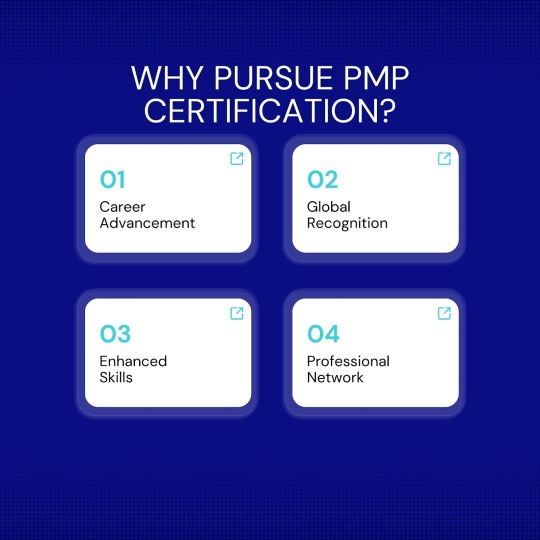
Enhanced Skills: The rigorous PMP exam preparation regimen hones your project management skills to a refined edge, applicable across a spectrum of industries.
Professional Network: Joining the esteemed community of PMP-certified professionals provides access to a rich tapestry of collaboration and knowledge exchange.
PMP Exam Overview
Crafted to gauge your proficiency in project management across five core domains:
Initiating
Planning
Executing
Monitoring and Controlling
Closing
Each domain scrutinizes specific tasks and knowledge domains, ensuring a robust grasp of project management principles and best practices.
PMP Exam Preparation
Embarking on PMP exam readiness demands unwavering dedication. Here's a roadmap to success:
Enroll in a PMP Course: Opt for a reputable PMP course encompassing all exam facets, armed with comprehensive study materials and mock exams.
Study the PMBOK Guide: Delve deep into the Project Management Body of Knowledge (PMBOK) Guide, the cornerstone of PMP exam preparation, acquainting yourself with its concepts and terminologies.
Practice: Leverage practice exams and sample questions to gauge your proficiency and pinpoint areas necessitating improvement.
Join Study Groups: Engage with fellow PMP aspirants through study groups or online forums to pool resources, exchange tips, and glean insights.
Develop a Study Plan: Chart a structured study regimen encompassing all exam topics, allotting ample time for review and practice sessions.
Conclusion
Attaining your PMP certification marks a pivotal milestone in your project management journey. By adhering to the strategies delineated in this guide and investing effort into your exam readiness, you're poised to confront the PMP exam with confidence and emerge triumphant. Initiate your voyage toward career zenith today by embarking on the path to PMP certification.
0 notes
Text
Charting Your Course: Expert Advice on PMP Preparation and Courses
The Project Management Professional (PMP) certification is a globally recognized certification for project managers. It demonstrates a professional's expertise in project management principles, practices and methodology. PMP certification is offered by the Project Management Institute (PMI) and is highly valued in various industries around the world.
What is PMP?
PMP is a designation awarded to individuals who meet certain education and experience criteria and pass the PMP certification exam. It shows that a project manager has the knowledge, skills, and experience to successfully lead and manage projects.
Importance of PMP Certification
PMP certification increases a project manager's credibility and opens new career opportunities. Employers often prefer candidates with PMP certification, as it validates their ability to deliver projects on time, within budget, and according to specifications.
PMP Exam Overview
The PMP exam assesses the candidate's knowledge in various areas of project management, including project initiation, planning, execution, monitoring and control, and closing. It consists of multiple choice questions that test the candidate's understanding of project management concepts and their application in real-world scenarios.
Benefits of PMP Certification
career advancement
PMP certification enhances a project manager's career prospects by demonstrating their commitment to professional development and continuous learning. This opens up opportunities for leadership roles and higher positions within organizations.
Earning potential increased
PMP-certified professionals typically earn higher salaries than their non-certified counterparts. According to PMI's salary survey, PMP certification holders earn an average of 25% more than those without the certification.
global recognition
PMP certification is recognized and respected worldwide. It validates a project manager's expertise and qualifications in managing projects of varying sizes and complexities, making them more marketable in the local and international job markets.
PMP Exam Structure
exam format
The PMP exam is a computer-based test consisting of 180 multiple choice questions. Candidates have four hours to complete the exam. The questions are based on the Project Management Body of Knowledge (PMBOK) guide, the standard reference for project management practices.
content area
Testing includes five performance domains: initiating, planning, implementing, monitoring and controlling, and concluding. Each domain is divided into specific tasks and knowledge areas in which a project manager must be proficient.
passing criteria
To qualify the PMP exam, candidates must obtain the minimum marks prescribed by PMI. The passing score is not disclosed, but is generally considered to be around 61% to 62% of the total questions answered correctly.
PMP exam preparation
PMP Preparation Course
Many professionals choose to enroll in PMP Prep courses to help prepare for the exam. These courses provide comprehensive study material, practice tests, and guidance from experienced instructors to help candidates succeed.
Self-study vs classroom training
Candidates can choose to self-study using PMP exam preparation books and online resources or attend classroom training sessions conducted by PMI Registered Education Providers (R.E.P.s). The choice depends on individual learning preferences and availability.
Exam Strategies and Tips
Effective exam preparation requires developing a study plan, practicing with sample questions, and familiarizing yourself with the exam format and content. It is important to manage time and remain calm under pressure during the exam.
Choosing the Right PMP Preparation Course
Accreditation and Reputation
When selecting a PMP course, it is important to choose a course that is PMI accredited and recognized for its quality and effectiveness in helping candidates pass the exam.
Course Content and Materials
The curriculum should comprehensively cover all exam topics and provide access to study materials including textbooks, practice exams, and online resources.
instructor expertise
Qualified trainers with extensive experience in project management and PMP exam preparation can provide valuable insight and guidance to help candidates succeed.
Top PMP Preparation Courses
Course Reviews and Ratings
Before enrolling in a PMP preparation course, it is advisable to read the reviews and ratings of previous students to assess the effectiveness and suitability of the course.
cost comparison
The cost of PMP preparation courses varies, so it is important to compare prices and consider the value offered in terms of course content, materials and instructor support.
Flexibility and study options
Some PMP preparation courses accommodate candidates' schedules and preferences.
Case Studies: Successful PMP Certification Journeys
real life experiences
Hearing from professionals who have successfully earned their PMP certification can provide valuable insight and inspiration for interested candidates.
lessons learned
Understanding the challenges and obstacles others face during their PMP journey can help candidates prepare effectively and avoid common pitfalls.
Tips for Aspiring PMPs
Experienced PMPs often share tips and strategies for exam preparation, time management, and overcoming challenges that can benefit those preparing for the exam.
Common Challenges in PMP Preparation
time management
It can be challenging for PMP aspirants to strike a balance between work, study and personal commitments. Effective time management is important to ensure adequate preparation for the exam.
overcoming test anxiety
The PMP exam can be difficult, which may cause anxiety and stress to some candidates. Techniques such as mindfulness, deep breathing, and positive visualization can help manage test anxiety.
balancing work and studies
Many PMP candidates are working professionals with busy schedules. It is important to maintain a balance between work and studies to avoid fatigue and maintain focus during exam preparation.
conclusion
PMP certification offers many benefits for project managers including career advancement, increased earning potential, and global recognition. By understanding the exam structure, preparing effectively, and choosing the right preparation course, aspiring PMPs can successfully pass the exam and enhance their professional credentials.
0 notes
Text
Why Conflict Management is Important in Project Management

Conflict is an inevitable aspect of human interaction, and is quite evidently essential in project management. Whether it's differences in opinion, conflicting priorities, or interpersonal tensions, conflicts can arise at any stage of a project. They have a significant impact on its success. In this blog, let's explore the importance of conflict management in project management. We will also examine the various ways in which conflicts can affect project outcomes and highlighting strategies for effectively managing and resolving conflict within project teams.

The Impact of Conflict on Project SuccessDisruption of Team Dynamics
Conflict can disrupt the cohesion and collaboration within project teams, leading to decreased morale, motivation, and productivity. When team members are focused on resolving conflicts rather than working towards project goals, project timelines and deliverables can be compromised.
Decreased Communication and Collaboration
Conflict often leads to breakdowns in communication and collaboration, as team members may become reluctant to share information, ideas, or feedback. Poor communication can result in misunderstandings, errors, and delays, further exacerbating conflict and hindering project progress.
Impaired Decision-Making in Project Management
Conflicts can impede the decision-making process within project teams, as conflicting viewpoints and agendas may hinder consensus-building and compromise. When decisions are delayed or compromised due to conflict, project timelines may be extended, and project outcomes may be compromised.
Increased Risk of Project Failure
Unresolved conflicts can escalate over time and have a detrimental impact on project outcomes. When conflicts are left unresolved, they can escalate into more significant issues, such as team turnover, stakeholder dissatisfaction, or project abandonment, increasing the risk of project failure.
The Importance of Conflict Management in Project Management
Promoting Open Dialogue: Effective conflict management promotes open dialogue and communication within project teams, creating a safe space for team members to express their concerns, opinions, and perspectives. By encouraging open communication, project managers can address conflicts proactively and prevent them from escalating.
Facilitating Collaboration and Problem-Solving: Managing conflict facilitates collaboration and problem-solving within project teams, as team members work together to identify root causes, explore solutions, and reach consensus. By harnessing the diverse perspectives and expertise of team members, conflicts can be transformed into opportunities for innovation and improvement.
Maintaining Focus on Project Goals: Effective conflict management helps project teams maintain focus on project goals and objectives, ensuring that conflicts do not derail progress or detract from project priorities. By addressing conflicts promptly and constructively, project managers can keep the project on track and minimize disruptions.
Building Stronger Relationships in Project Management: Conflict management provides an opportunity to build stronger relationships and trust within project teams, as team members learn to navigate conflicts collaboratively and respectfully. Fostering a culture of trust and mutual respect helps project managers create a positive team environment. Here, the conflicts are viewed as opportunities for growth and learning.
Strategies for Effective Conflict Management in Project Management
Encourage open communication and active listening.
Clarify roles, responsibilities, and expectations.
Foster a culture of respect, trust, and collaboration.
Address conflicts promptly and constructively.
Seek win-win solutions through compromise and consensus-building.
Conclusion
By understanding the impact of conflict on project outcomes and implementing strategies for effectively managing conflict, project managers can promote open communication, collaboration, and problem-solving within project teams, ultimately enhancing project success and stakeholder satisfaction. By viewing conflicts as opportunities for growth and learning, project managers can transform conflicts into catalysts for innovation and improvement, driving continuous improvement and excellence in project management practices.
If you want to dive deeper into project management and start a career in the field eventually, enroll at MindCypress. It offers online training programs and courses for professionals across the globe. The learning platform offersProject Management Professional Instructor Led Online Training that prepares you for a lucrative career.
Resource:https://www.mindcypress.com/blogs/project-management/why-conflict-management-is-important-in-project-management
0 notes
Text
PMP Prep
Master the art of project management with our specialized PMP Prep program. Gain invaluable skills and knowledge to excel in your professional journey.
0 notes